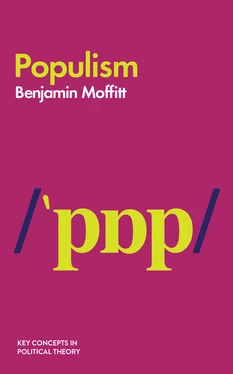Accompanying the popular interest in populism has been a veritable explosion of work on this topic in academic literature. While the concept has enjoyed widespread usage and in-depth analysis in the literatures on European and on Latin American politics as well as in political theory over the past two decades or so, the twin 2016 populist shocks – Trump’s victory and the outcome of the Brexit referendum – saw populism move from being a relatively marginal topic in the discipline of political science to being one of its hottest – and most hotly debated. This sudden escalation in importance saw a vast number of researchers who worked on themes even remotely related to populism suddenly become ‘experts’ on it and link it with areas as diverse as those of fake news, the alt-right, ‘post-truth’ politics, anarchism, and fascism. For those who had worked on populism for years, usually toiling away in the subfields of area studies, comparative politics, party politics or political theory, this was quite a surprise.
The popularity of the term has been something of a double-edged sword, however. While the expansion of the field is in many ways most welcome, with new insights and methods being brought to bear on the topic from fields including political psychology, political communications and media studies, it is also true that populism ‘has become the buzzword of the year mostly because it is very often poorly defined and wrongly used’ – not only in popular discussions, but in academic discussions as well – as leading scholar of populism Cas Mudde (2017b) put it in the Guardian . As a consequence, newcomers to the topic may be understandably confused by the plethora of bad definitions that plague the term: where does one even begin, if you want to understand populism? Is it synonymous with racism? Is it left wing or right wing? Is it the same as authoritarianism? Is it good or bad for democracy? How are we supposed to make sense of this mess?
It is at this juncture that this book comes in. It aims to offer a concise account of contemporary approaches to populism, mapping conceptual debates about what populism ‘is’, delineating the different theoretical traditions used to approach the concept, and presenting you with a clear entry point and overview of what can otherwise be a sprawling – and at times impenetrable – literature. Tracing the concept’s development from the late nineteenth century in the US prairies to the definitional debates today around whether it is an ideology, a strategy or a mode of discourse or performance, this study makes clear that populism is a core concept for understanding democratic politics across the globe. Beyond these definitional concerns, the book also explores how populism relates to and intersects with some of the concepts at the heart of political theory and, more widely, at the heart of political debate today: nativism, nationalism, socialism, liberalism and democracy.
What makes this study different from other introductory texts on the topic of populism that have been released in recent years is that it offers the first accessible introduction to populism as a concept in political theory . While other texts have tended to lead through a focus on empirical data, theory a secondary concern, here the key conceptual battles over the meaning and normative content of populism remain primary, through focus on the arguments of such influential thinkers as Ernesto Laclau, Chantal Mouffe, Cas Mudde, Jan-Werner Müller and Margaret Canovan. The aim is to demonstrate that debates about populism are never just about the cases at hand (for example, whether Trump is a menace to democracy or not), but rather that these debates and questions act as a prism through which key assumptions and normative arguments about contemporary democracy itself are played out in a rough-and-tumble style. In a time characterised by ‘the global rise of populism’ (Moffitt 2016), it is important we get to terms with what is truly at stake in these debates.
The focus on theory, however, does not mean that this book should be avoided by anyone allergic to the (at times) dense and difficult lingua franca of political theory. While theoretical texts in the field of populism studies have tended to be dominated by those influenced by the work of Laclau and Mouffe (Laclau 2005a; Laclau and Mouffe 1985; Mouffe 2018) – my own work included (Moffitt 2016) – these texts can be understandably daunting for newcomers, given that the theoretical concepts used in them have a rather steep learning curve and often rely on a background in post-structuralism, Marxist thought and psychoanalysis (among other areas). The present book aims to translate such theory into language more easily grasped by newcomers to the field, which hopefully has the effect of rendering the theoretical and conceptual advancements made by the authors mentioned and their interlocutors accessible and useful.
But never fear: this book is not just about what different scholars have argued about when it comes to populism. It assumes that you are reading it because you are probably interested in real-world political developments that have been subsumed under the heading of ‘populism’ in recent years, and hence it draws on evocative examples of populism across the globe, primarily from the last two decades, to illustrate, flesh out, challenge and make sense of the conceptual arguments at play. It should be noted that the book’s primarily contemporary focus means that it does not attempt to read populism back into history – say, by looking at the role of the demos in ancient Athens – but rather chooses to concentrate its attention on what has actually been called (or called itself) populist, given that this is presumably what the reader is most interested in at this particular, ‘populist’ moment.
In order to work towards these outlined goals, the book is structured to introduce you to the core definitional debates at play in the literature on populism, before moving on to central normative and ideological debates about populism’s relationship to other core concepts in political theory. It proceeds as follows.
Chapter 2, ‘What Is Populism?’, outlines the key approaches to populism in the academic literature: the ideational approach, which views populism as a distinct ideology or worldview; the strategic approach, which sees it as an electoral strategy or mode of organisation; and the discursive–performative approach, which sees it as a type of discourse or performance. The chapter outlines the key authors associated with each of these approaches and the key definitions and arguments they use, then considers the strengths and weaknesses of each approach. It also traces the historical roots of each approach, paying attention to its intellectual lineage, and takes stock of what is theoretically and methodologically specific to each. Arguing that all central approaches pivot on the distinction between ‘the people’ and ‘the elite’, it nonetheless highlights the important epistemological and normative differences that underlie each approach. These differences have tended to remain underexplored in debates about the various conceptual camps in the contemporary literature.
The following three chapters explore populism’s relationship to other key ‘isms’ at the core of debates in contemporary political theory: nationalism, nativism, socialism and liberalism. Chapter 3addresses the relationship between populism, nationalism and nativism, which are commonly conflated in the academic literature or treated as synonymous terms in popular discussions. However, this chapter argues that populism and nationalism, while both drawing on the key signifier ‘the people’, adopt different characterisations of ‘the people’ and ultimately target different enemies. To explore this situation, the chapter examines how right- and left-wing populists draw on nationalism in distinct ways: it argues that left-wing populists tend to use a civic form of nationalism, whereas right-wing populists tend to use an ethnic one – or what might better be understood as nativism. In making this argument, the chapter also examines cases of populism that do not fit into the ‘national’ box – including municipal and regional subtypes of populism at a subnational level (e.g. the cases of Toronto’s mayor, Rob Ford, and of Lega Nord (Northern League) in Italy) and international and transnational populism at a supranational level (e.g. the cooperation between populists in Europe and Latin America, and the transnational populist case of the Democracy in Europe Movement 2025) – and shows that the association between nationalism and populism, or even between populism and the national, is far from automatic.
Читать дальше











![Benjamin Franklin - Memoirs of Benjamin Franklin; Written by Himself. [Vol. 2 of 2]](/books/747975/benjamin-franklin-memoirs-of-benjamin-franklin-wr-thumb.webp)
![Benjamin Franklin - Memoirs of Benjamin Franklin; Written by Himself. [Vol. 1 of 2]](/books/748053/benjamin-franklin-memoirs-of-benjamin-franklin-wr-thumb.webp)